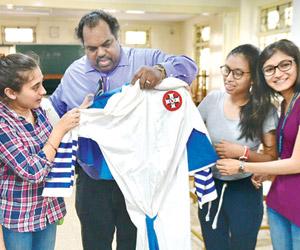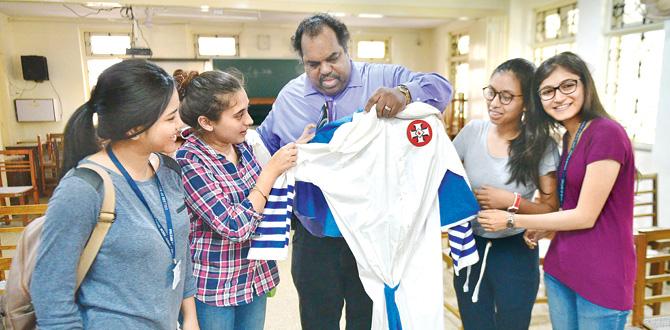Davis is a musician and his energetic style of 'boogie woogie piano', as a background search on him throws up, is manifest in his zingy talk about his tireless pursuit of equality in race relations


Daryl Davis shows students a Ku Klux Klan robe, worn by the white supremacist cult. Pic/Bipin Kokate
ADVERTISEMENT
Daryl Davis fills up a room with his presence. Voluble and expressive, the American rock 'n' roll pianist held his audience captive at Churchgate's Nirmala Niketan College on Tuesday afternoon.
Davis is a musician and his energetic style of 'boogie woogie piano', as a background search on him throws up, is manifest in his zingy talk about his tireless pursuit of equality in race relations, smashing black stereotypes and taking on white supremacists through dialogue, "because only if we talk will we realise that we have more in common than we have in contrast," said Davis.
The genesis
Davis spoke about how he got Ku Klux Klansmen (KKK) to give up their robes, a physical manifestation of the supremacist ideology. "The Imperial Wizard (national leader) of the KKK Mr Kelly would come to my home, sit at my 'inferior' table and eat my 'inferior' food," he stated underlining the Davis dictum: only conversations can bring about change and even if there is no change in people, you need to converse," as the genesis of his journey of anti-discrimination began with the premise 'if you do not know me, how can you hate me?'
Bolder now
After Davis spoke about his personal journey, he opened up the discussion to questions. One question was about reports that KKK members were increasing in a climate perceived by some as fertile for bigotry in the Donald Trump era in USA. Davis said, "The numbers are not increasing but the white supremacists are more visible and bolder because of the environment. They certainly feel more comfortable speaking about their beliefs than they did earlier." Folding up a Klansman's robe and hat in his little black bag, Davis did accede though, "Because of Trump, we are having all the conversations that were taboo earlier. We discuss sexual harassment, women are marching for equal pay, there are debates on immigrants, and racism… these topics are out in the open."
Travel diary
Davis brought a lighter touch to the sobering conversation when he spoke about "music being a great unifier." He was pulled into another question about police brutality and did admit that, "it is a problem in the USA, with a greater number of black people being victims than white". Stressing the importance of separating "fiction from reality" while addressing a question about black stereotypes in Hollywood, he said, "they are usually portrayed as drug lords and criminals." He added, "Travel gave me exposure and a world view. India is country number 55 on my list and I have been on six continents."
Asked about why he collected white supremacist memorabilia, Davis said, "It is important because it is part of American history. Albeit, a shameful, ugly part. It is like having a Holocaust museum, the Holocaust was shameful but it is important to acknowledge it existed." Taking on a question about his style being criticised by some and being labelled deliberately controversial, Davis said it is because, "people do not like it when you challenge the status quo or have different methods of fighting racism."
A journey
"My parents had to use separate bathrooms from whites, drink from a separate water fountain, sit at the back of a bus and were not allowed to eat at certain restaurants. I was not subjected to this, but like they fought for their rights, it is up to me to fight for the rights of the next generation," signed off the musician, who was excited to learn that Mumbai has a blues music festival and was going to rock 'n' roll into Ahmedabad and Chennai next.
Catch up on all the latest Mumbai news, crime news, current affairs, and also a complete guide on Mumbai from food to things to do and events across the city here. Also download the new mid-day Android and iOS apps to get latest updates
 Subscribe today by clicking the link and stay updated with the latest news!" Click here!
Subscribe today by clicking the link and stay updated with the latest news!" Click here!






